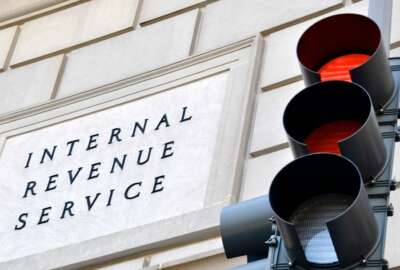To listen to the Federal Newscast on your phone or mobile device, subscribe in PodcastOne or Apple Podcasts. The best listening experience on desktop can be found using Chrome, Firefox or Safari.
- The military has made some gains in recruiting women over the past 15 years — but they’re still much less likely to serve for a full career than men are. The Government Accountability Office analyzed Defense Department personnel data going back to 2004, and found the military is 16.5% female, now compared to 15.1% back then. But GAO’s modeling shows women are still 28 percent more likely to leave the military than their male counterparts. GAO says the Pentagon has recognized the importance of increasing its female population, but still doesn’t have goals, performance measures or timeframes to make sure that happens.
- The U.S.S. Theodore Roosevelt is set to head back out to sea this week. The aircraft carrier has been tied up in Guam for the last two months while its crew moved into quarantine to deal with a coronavirus outbreak. For now, the Roosevelt will operate with a scaled-back crew of about 3,000 sailors. 1,800 are still in quarantine on shore. 1,000 of the carrier’s crewmembers have tested positive for the virus over the past two months. (Federal News Network)
- New hiring and onboarding practices seem to be paying off at the Veterans Health Administration. VHA hired 12,000 new employees during the last six weeks. Hiring surged by 48% during one two-week period in March compared to the previous year. The number of new hires equates to a one percent net increase in the VHA workforce. VHA waived and delayed some of the usual screening and credentialing procedures to get new employees to work more quickly. The agency says some of the hiring and onboarding changes made during the pandemic could become permanent. (Federal News Network)
- The Defense Innovation Unit has shown progress in the way it awards contracts. The Pentagon’s hub for commercial innovation reported transitioning eight products from prototypes to usable technologies in troops’ hands last year. That’s half the number of all the products that transitioned in the two and a half years prior. The Defense Innovation Unit also says it cut sixty days off its time to award a contract, coming in at just under 130 days. The stats bode well for DIU, which is under the scrutinizing eye of Congress as the posterboy for how well DoD can adapt to new ways of buying state of the art weapons quickly. (Federal News Network)
- Six agencies modified rules that reduced the regulatory burden on small businesses by $773 million in 2019. In its annual report to Congress, the Small Business Administration’s Office of Advocacy says the Labor Department’s change to the “white collar” exemption from overtime rules under the Fair Labor Standards Act accounted for the largest amount of compliance savings. The Office of Advocacy tracks agency progress in meeting the requirements of two executive orders issued by President Donald Trump to reduce the regulatory burden on small firms.
- The federal government could save tens of billions of dollars if it responds to the Government Accountability’s Offices recommendations on duplication and overlap. GAO says agencies have reaped $429 billion in savings by tackling 900 recommendations to date. But they could save more by implementing more shared services initiatives, cutting excess work at military depots and toughening security measures at the IRS. GAO added 168 new actions to its annual report on fragmentation, overlap and duplication. It also added 88 new actions to 10 existing recommendations.
- During an online Q&A sponsored by six federal IT trade associations, Rep. Gerry Connolly (D-Va.) says pandemic IT failures have clearly shown the need for more modernization money. House Democrats proposed $1 billion in the Heroes Act, compared to $25 million in the current fiscal year. Connolly says too few of his colleagues understand that most of the $95 billion agencies already spend on IT is spoken for, keeping old systems alive.
- The Pandemic Response Accountability Committee is building out its leadership. Linda Miller, a fraud risk management executive at Grant Thornton, will serve as the committee’s deputy executive director. Miller previously worked at the Government Accountability Office, where she led teams of analysts in evaluating fraud, improper payments and internal controls in agency programs. She also helped draft the 2015 Fraud Reduction and Data Analytics Act.
- It’s all hands on deck for the Bureau of the Fiscal Service to get pandemic payments out the door. Bureau Commissioner Tim Gribben says the agency can print about 5-7 million checks a week, and employees are working overtime to keep up with demand. But so far nearly 80% of payments have gone out electronically. The Treasury Department has sent out more than 140 million pandemic stimulus payments worth nearly $240 billion. (Federal News Network)
- The IRS will bring as many as 11,000 employees back to work next month in a second wave of reopening agency facilities. IRS Commissioner Chuck Rettig says the agency will bring back employees who work in Texas, Utah, and Kentucky to carry out tax filing season work that can’t be done remotely. About 9,000 employees teleworking in those states will continue to work remotely so employees in the office can practice social distancing. (Federal News Network)
- A major government contractor lost its place on the GSA schedules program. The General Services Administration terminated the schedule contracts of McKinsey and Company. The move comes a year after a critical inspector general report found McKinsey charged higher prices than it originally proposed. GSA and the company tried to renegotiate prices under the schedule contracts for technology and professional services, but could not come to an agreement. McKinsey won more than $173 million through the schedules in 2019 This is the first time GSA cancelled a major government contractor’s schedule contract since 2012 when it kicked Oracle out of the program. (Federal News Network)
Copyright
© 2025 Federal News Network. All rights reserved. This website is not intended for users located within the European Economic Area.



